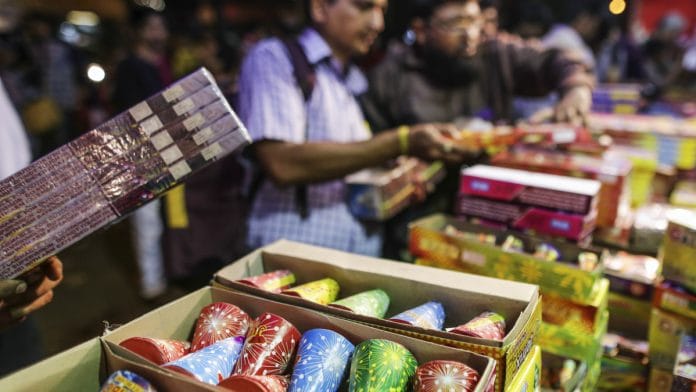New Delhi: Green firecrackers that emit up to 30 per cent less particulate matter than traditional fireworks are available across the country ahead of Diwali, Union Science Minister Harsh Vardhan said Saturday.
At an event in the national capital, researchers from the National Environmental Engineering Research Institute (NEERI) of the Council of Scientific & Industrial Research (CSIR) demonstrated the green crackers developed in-house in the presence of the Union minister.
Vardhan said the green variants of popular festival fireworks, such as flowerpots, pencils and sparklers, will now be available in the market.
The announcement comes amid a growing movement in India, especially in heavily-polluted cities like New Delhi, against bursting of firecrackers on festivals like Diwali.
However, with such festivals now associated primarily with firecrackers, the movement has met with severe resistance from many sections of the public.
Also read: Biochar could be the solution to crop burning that Indian farmers were waiting for
The new element
The new CSIR-NEERI formulation for green crackers has no barium nitrate — one of the key ingredients of traditional firecrackers.
These crackers have been named “safe water releaser (SWAS)”, “safe minimal aluminium (SAFAL)” and “safe thermite cracker (STAR)”. The three crackers release water vapour or air as a dust suppressant and diluent for gaseous emissions.
SWAS and STAR eliminate the use of potassium nitrate and sulphur, and reduce particulate matter like sulphur dioxide and nitrogen oxide by at least 30 per cent. The two types have matching sound intensity with commercial crackers, that is, in the range of 105-110 dBA.
SAFAL minimally uses aluminium, which results in at least 35 per cent reduction in particulate matter compared to commercial crackers. Its sound intensity matches with commercial crackers in the 110-115 dBA range.
The product categories include Chinese crackers, maroons, atom bombs, flowerpots, pencils and sparklers.
According to a statement issued by the CSIR, the samples of these new crackers meet the stipulated norms of green crackers.
Working with firecracker manufacturers, the institute has developed “improved formulations” that have reduced amounts of barium nitrate for light categories of firecrackers like charkhas.
These products can only be manufactured by those who have signed a non-disclosure agreement (NDA) with CSIR-NEERI. Currently, over 230 MoUs and 165 NDAs have been signed with firework manufacturers.
According to CSIR-NEERI director Rakesh Kumar, nearly 530 emission testing certificates have been issued to firework manufacturers for new and improved formulations that meet the guidelines.
The green crackers will be sold with a unique logo on the box, and will also have a QR code with production and emission details.
The road ahead
While these green firecrackers had been developed almost a year ago, the Supreme Court approved their bulk manufacturing earlier this year, subject to the government-run Petroleum and Explosives Safety Organisation (PESO) approving the chemical formulation.
Firecrackers are considered to be one of the major aggravators of the notorious winter pollution that plagues Delhi every year.
Stubble burning in Punjab and Haryana is considered the major contributor to Delhi’s pollution, which often blankets the city in a dystopian smog. Diwali firecrackers add to the smog, which usually takes days to clear.
Last year, the Supreme Court had banned the manufacture of polluting firecrackers just before Diwali, allowing only green crackers to be sold in the country in order to control pollution levels. It had also restricted the use of firecrackers to a two-hour window on Diwali. However, the rule was reportedly flouted widely.
Also reads: Why the new UN report on climate change is alarming for India’s fishing ecosystem & oceans







Are they affordable? What about the availability of the product? These are the questions comes to mind when Indian research agencies introduce a product.